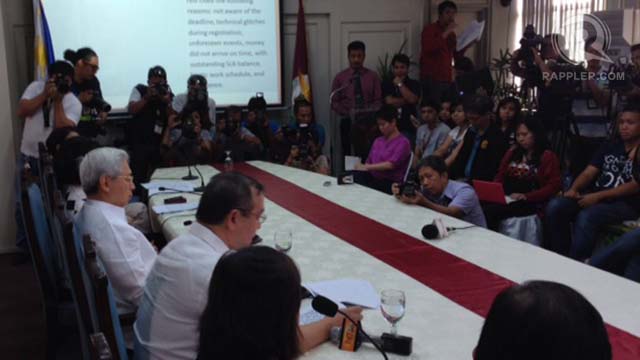SUMMARY
This is AI generated summarization, which may have errors. For context, always refer to the full article.

MANILA, Philippines – (UPDATED) No guilt.
UP Manila Chancellor Manuel Agulto told a press conference on Monday, March 18, they did everything they could to help Kristel Tejada, the 16-year-old freshman who committed suicide last week, reportedly over failure to pay tuition on time.
(Rappler initially named her “Lorena” to protect her identity. But since she has already been named by UP officials, we are using her real name as well.)
He turned emotional in the press conference but said, “My outburst was because I remembered how hard it was for me to get my medical degree. As far as guilt is concerned, wala (none).”
Although the university issued its October 23 memorandum indicating a “no late payment” policy, they gave students with financial difficulty special consideration.
“We do not wish to give anyone a difficult time. We dream for them as they aspire for their future. As administrators we are not enemies. I would like to consider myself as a surrogate parent to our students, faculty and staff,” Agulto said.
He added, “We do not wish to pose obstacles in realizing their dreams. In fact, we wish even bigger dreams for them. We always want to work with our students because we were once like them.”
Vice Chancellor Josephine de Luna, who signed the memo said, “there were 79 appeals for late payments that were approved from the period November to December 2012. So it was really extended for students who were requesting for late payments.”
Agulto emphasized that a leave of absence (LOA) is not a penalty imposed on students unable to pay on time. He said that a LOA is provided for “officially unenrolled” students so that they can resume schooling in the next school term, as was the case for Tejada.
The university also had to follow due process.
Due process
UP President Dr Alfredo Pascual justified their denial of Tejada’s appeal for late payment and for re-bracketing under the Socialized Tuition and Financial Assistance Program (STFAP).
He explained that upon her enrollment in UP Manila, Tejada was categorized under STFAP Bracket D. This means that she is required to pay P300 per unit plus miscellaneous fees.
Her total assessed fees as of the first semester of school year 2012-2013 amounted to P9,172.50. She was able to pay this by availing of a student loan amounting to P6,377 and by paying the partial amount of P2,795.50 upon her registration.
To be relieved from paying her student loan, Tejada appealed for a re-bracketing to a lower STFAP bracket on Sept 27, 2012. However, Agulto noted that she failed to submit the requirements needed for the appeal to be processed for the designated period.
Extension
During the registration period for the second semester, Tejada’s father requested for an extension to settle their outstanding loan.
UP Manila administration heeded their request and moved the deadline from October 31 to Nov 20, 2012 under the condition that they pay the full tuition amount and miscellaneous fees for the 2nd semester upon registration.
Tejada was granted a total of 3 extensions for the payment of her student loan. These were dated November 30, December 7, and December 19. Tejada was finally able to settle her student loan on Dec 19, 2012 and was able to get another loan form.
Agulto also noted that Tejada only appealed for late payment of her tuition fee on January 23, or 9 weeks past the deadline set for the semester.
Improving financial assistance
Pascual acknowledged problems and constraints plaguing the current STFAP system. These include:
- Long and tedious application process
- Perceived mismatch between indicators and the actual financial need of the students
- Inadequate allowance for the lowest bracket students who do not pay for anything
- Intensive verification delayed decisions
- Limited complementing financial assistance programs
Pascual said that the school administration is currently reviewing proposals to reform the STFAP application process. One of the most cited criticisms against STFAP is the tedious process it involves. To address this, reducing the application form from 14 pages to no more than 2 pages has been proposed.
Pascual said that STFAP requirements such as financial and family background will also be integrated into the application form for admission. House visits, he added, will still continue, but will be done by random sampling. Among the proposed changes to the system is an increase in the monthly allowance of students in the lowest bracket.
By fast-tracking applications, Pascual said that from 6 months, processing should be reduced to two months. This will pave the way for earlier announcements of STFAP brackets and the acceptance of appeals for re-bracketing, if any. They also hope to improve data on the family income of students applying for financial assistance to make sure that those who need it most get the financial aid.
According to the UP president, he had actually started reviewing the STFAP process as early as he assumed his post. The review process, he said, was not a reaction to the suicide incident.
Meanwhile, the faculty and staff of the Department of Behavioral Sciences of UP Manila issued a statement on Monday, March 18, expressing their sympathy for Tejada’s family. They also pinned the blame on Chancellor Agulto and Vice Chancellor de Luna and urged the two to resign as a sign of “their solidarity and humility to the aggrieved family of Tejada.” Below is the full text of the statement:
UP Manila Department of Behavioral Sciences Statement on the Death of Kristel Tejada
– Rappler.com
Add a comment
How does this make you feel?
There are no comments yet. Add your comment to start the conversation.